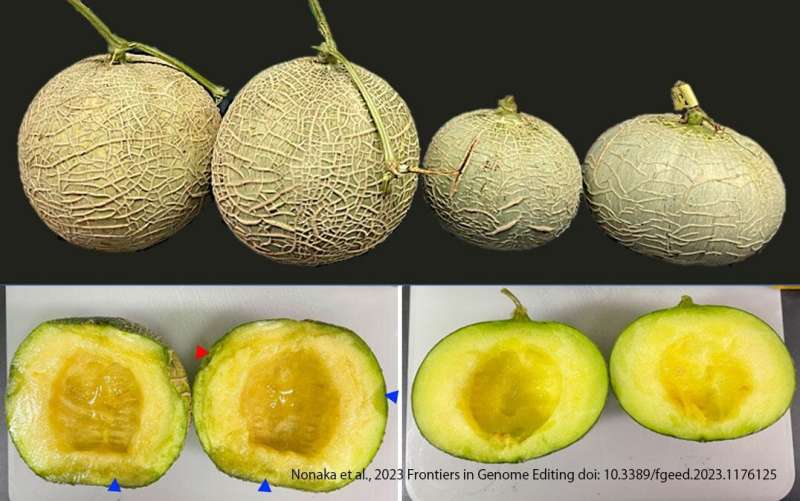
The gaseous plant hormone ethylene has been long known to promote fruit ripening and plays a certain role in shelf-life. In a study published in Frontiers in Genome Editing, researchers performed gene editing using the Clustered Regularly Interspaced Short Palindromic Repeats (CRISPR)/Cas9 system via modification of the ethylene synthesis pathway in the Japanese luxury melon (Cucumis melo var. reticulatus “Harukei-3”) to increase its shelf life.
The enzyme 1-aminocyclopropane-1-carboxylic acid oxidase (ACO) is associated with the final step of the ethylene production pathway and has multiple homologous genes.
The research group has previously demonstrated five CmACO genes (homologous genes of ACO) in the melon genome and shown that the CmACO1 gene is predominantly expressed in the harvested fruit. Therefore, they expected that CmACO1 would be an important gene for enhancing the preservation of the melon fruit.
In this study, CmACO1 was selected as a target of gene editing and attempted to introduce mutations in the gene. The harvested melons exhibited no foreign genes and the mutations induced were inherited for at least two generations.
In the non-gene-edited line (wild type), ethylene generation was observed in the fruit 14 days post-harvest, the rind turned yellow, and the flesh softened. However, in the genome-edited mutant, ethylene generation was reduced to one-tenth of that in the wild type, with the skin color remaining green and the fruit remaining firm. This indicates that introducing CmACO1 mutation via gene editing enhanced the shelf life of the melons.
The results of this study indicate that gene editing can contribute to food loss reduction and improve food security.
More information:
Satoko Nonaka et al, Targeted modification of CmACO1 by CRISPR/Cas9 extends the shelf-life of Cucumis melo var. reticulatus melon, Frontiers in Genome Editing (2023). DOI: 10.3389/fgeed.2023.1176125
Provided by
University of Tsukuba
Citation:
Modifying shelf-life of melons via gene editing (2023, July 25)
retrieved 25 July 2023
from https://phys.org/news/2023-07-shelf-life-melons-gene.html
This document is subject to copyright. Apart from any fair dealing for the purpose of private study or research, no
part may be reproduced without the written permission. The content is provided for information purposes only.










